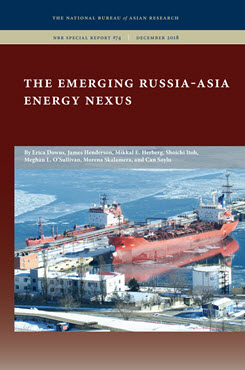Japan's Opaque Energy Policy toward Russia
Is Abe Being Trumped by Putin?
This essay examines Tokyo’s proactive energy outreach to Moscow amid Western sanctions and assesses its consequences for U.S.-Japan energy cooperation, as well as for overall Japan-Russia relations.
EXECUTIVE SUMMARY
MAIN ARGUMENT
Prime Minister Shinzo Abe, with his self-proclaimed deep trust in President Vladimir Putin, has made striking a historic deal on improving Japan-Russia relations a priority. The Abe administration’s economic cooperation proposals prioritize the energy sector as an area to capture Moscow’s interest, despite difficulties identifying economically viable gas and oil projects. Russia aims to consolidate and strengthen its LNG export capacity against emerging competition with the U.S., and Tokyo has pursued policies that essentially underpin this ambition, despite the importance of U.S.-Japan cooperation on LNG to Japan’s long-term interests and energy security.
POLICY IMPLICATIONS
- The Abe administration needs to realize that only power politics will draw Moscow’s serious attention to improving Japan-Russia relations. Tokyo’s appeasement policy reflects wishful thinking on the outcomes of economic cooperation and will likely be exploited by Putin to further destabilize the West without offering tangible benefits in return to Japan.
- Japan should stop politically covering up the difficulty of identifying economically viable gas and oil projects in Russia, given that they would not bolster Japan’s energy security or weaken the Sino-Russian partnership.
- The U.S. and Japan should accelerate efforts to jointly shape the expansion of the global LNG market and increase further market opportunities for U.S. LNG exports. A thorough review of Japan’s energy policy toward Russia should be undertaken to ensure that it does not damage this strategic objective.
Shoichi Itoh is a Senior Analyst at the Institute of Energy Economics, Japan (IEEJ). He is also the Reconnecting Asia Virtual Fellow at the Center for Strategic and International Studies and a Visiting Professor in the Slavic-Eurasian Research Center at Hokkaido University. He is the author of multiple publications on energy ties between Russia and Asia, including Russia Looks East: Energy Markets and Geopolitics in Northeast Asia (2011).
NOTE: The views expressed in this essay are solely the author’s own and do not represent any of the organizations with which he is affiliated.



